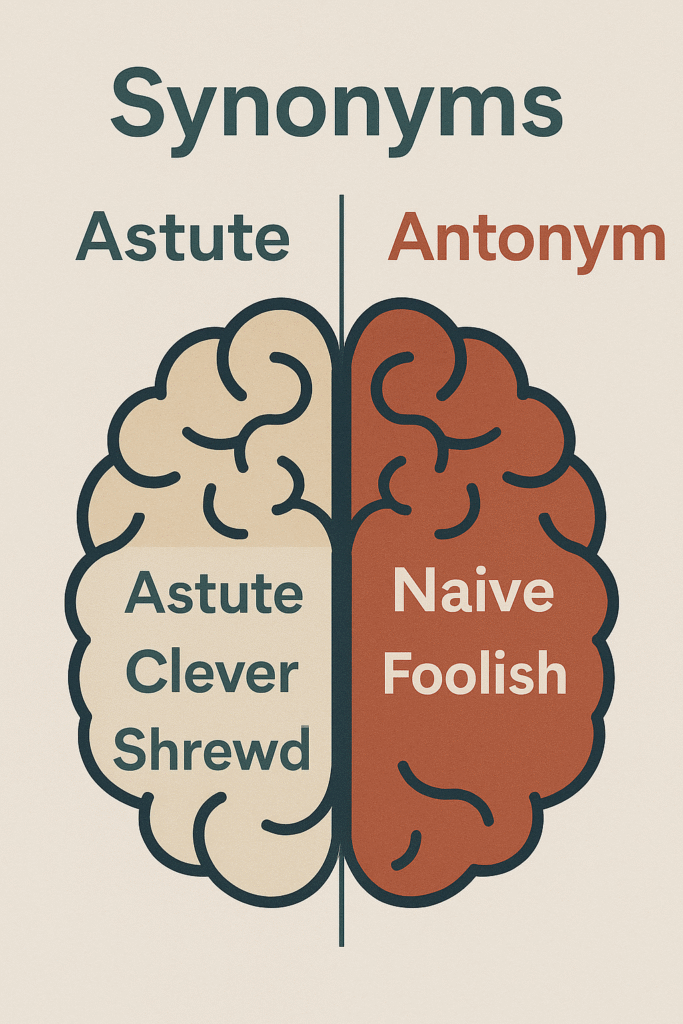📘 Introduction to ‘Astute’
In today’s fast-paced world, being able to quickly assess situations, read between the lines, and make sharp decisions is a superpower. And there’s one word that perfectly captures this trait: Astute.
Used in business, leadership, education, and daily life, astute describes someone who is smart, observant, and strategic. But how do you use it correctly? What’s the difference between being astute and just “smart”? In this blog, we’ll explore the meaning, usage, examples, and real-world relevance of the word “astute.”
📖 Meaning and Simple Definition
What does Astute mean?
Astute (adjective):
Having or showing sharp judgment and the ability to accurately assess situations or people, often to one’s advantage.
In simple words:
👉 If you’re astute, you’re clever, sharp-minded, and strategically smart.
📚 Definitions from Trusted Sources:
- Cambridge Dictionary
“Able to understand a situation quickly and see how to take advantage of it.“
➡️ Cambridge Dictionary – Astute - Merriam-Webster
“Having or showing shrewdness and an ability to notice and understand things clearly.“
➡️ Merriam-Webster – Astute - Collins Dictionary
“An astute person is clever and has good judgment.“
➡️ Collins Dictionary – Astute
🔊 Pronunciation and Spelling Guide
- Phonetic: uh-STOOT
- IPA: /əˈstjuːt/ (UK), /əˈstuːt/ (US)
- Syllables: 2 – a·stute
📜 Origin and Etymology
The word astute first appeared in the early 17th century and comes from the Latin word astutus, meaning “clever” or “crafty.” It is linked to the root astus, meaning “cunning” or “skill.”
Over time, the negative connotation of trickery faded, and today, astute is viewed positively — especially in professional or intellectual settings.
🔍 Astute in Different Contexts
Let’s look at how the word astute is used across various fields:
🔹 In Business:
“She made an astute investment that doubled the company’s revenue.”
🔹 In Politics:
“The candidate’s astute responses impressed both the panel and the audience.”
🔹 In Education:
“His astute analysis of the poem revealed layers even the teacher hadn’t noticed.”
🔹 In Daily Life:
“An astute shopper can spot real value in seconds.”
🧠 Astute vs Similar Words (Smart, Clever, Wise)
| Word | Meaning | Example |
|---|---|---|
| Astute | Smart with good judgment & strategy | “She gave an astute reply.” |
| Clever | Quick and mentally agile | “He came up with a clever solution.” |
| Wise | Knowledgeable and thoughtful | “Her advice was wise and kind.” |
| Shrewd | Street-smart, strategic | “A shrewd businessman never loses money.” |
✅ Use astute when someone is mentally sharp and insightful, especially in practical or strategic matters.
✍️ Example Sentences
- “He’s astute at spotting trends before they go viral.”
- “That was an astute observation during the meeting.”
- “Only an astute mind could solve that puzzle so fast.”
- “Her astute negotiating skills landed the best deal.”
✅ Synonyms and ❌ Antonyms
✅ Synonyms:
- Shrewd
- Smart
- Insightful
- Strategic
- Clever
- Perceptive
❌ Antonyms:
- Naive
- Clueless
- Slow
- Gullible
- Unwise
- Foolish

⚠️ Common Mistakes and Misunderstandings
- Using it interchangeably with ‘smart’:
All astute people are smart, but not all smart people are astute. - Wrong context:
❌ “She is astute at playing video games.”
✅ Better: “She is astute at analyzing game strategies.” - Misspelling:
Common wrong versions: astut, astoot, astewt
🏠 How to Use “Astute” in Daily Life
Use “astute” to sound more precise in conversations or writing:
- Resume: “Astute decision-maker with experience in market analysis.”
- Social Media: “Only astute minds noticed this twist in the plot!”
- Classroom: “That was an astute answer to a complex question.”
💼 Astute in Business and Decision-Making
In business, astute is a power word. It suggests:
- Strategic thinking
- Smart risk-taking
- Problem-solving ability
- Awareness of subtle trends
📌 Example:
“Our CEO’s astute leadership turned the startup into a global brand.”

🧾 Grammar and Usage Patterns
Use “astute” before or after a noun:
- ✅ “An astute investor knows the market.”
- ✅ “He is astute when it comes to negotiations.”
Often paired with:
- Astute observation
- Astute strategy
- Astute mind
- Astute judgment
🧩 Quiz: Test Your Understanding
Fill in the blank:
“Her ______ decision saved the company millions.”
a) Naive
b) Astute ✅
c) Random
d) Foolish
True or False:
Astute and careless mean the same thing.
➡️ False
📝 Conclusion and Final Thoughts
The word astute is more than just a synonym for smart — it’s about being strategically intelligent, sharp, and aware. Whether you’re navigating business, education, or everyday life, being astute helps you stay one step ahead.
Now that you understand how to use astute, try incorporating it into your next conversation or caption. It might just make you sound a little more… well, astute. 😉
🔗 Outer Links for Further Reading:
💬 Your Turn!
Comment below:
🧠 What’s the most astute decision you’ve ever made?
Let’s inspire each other with clever moments and lessons!